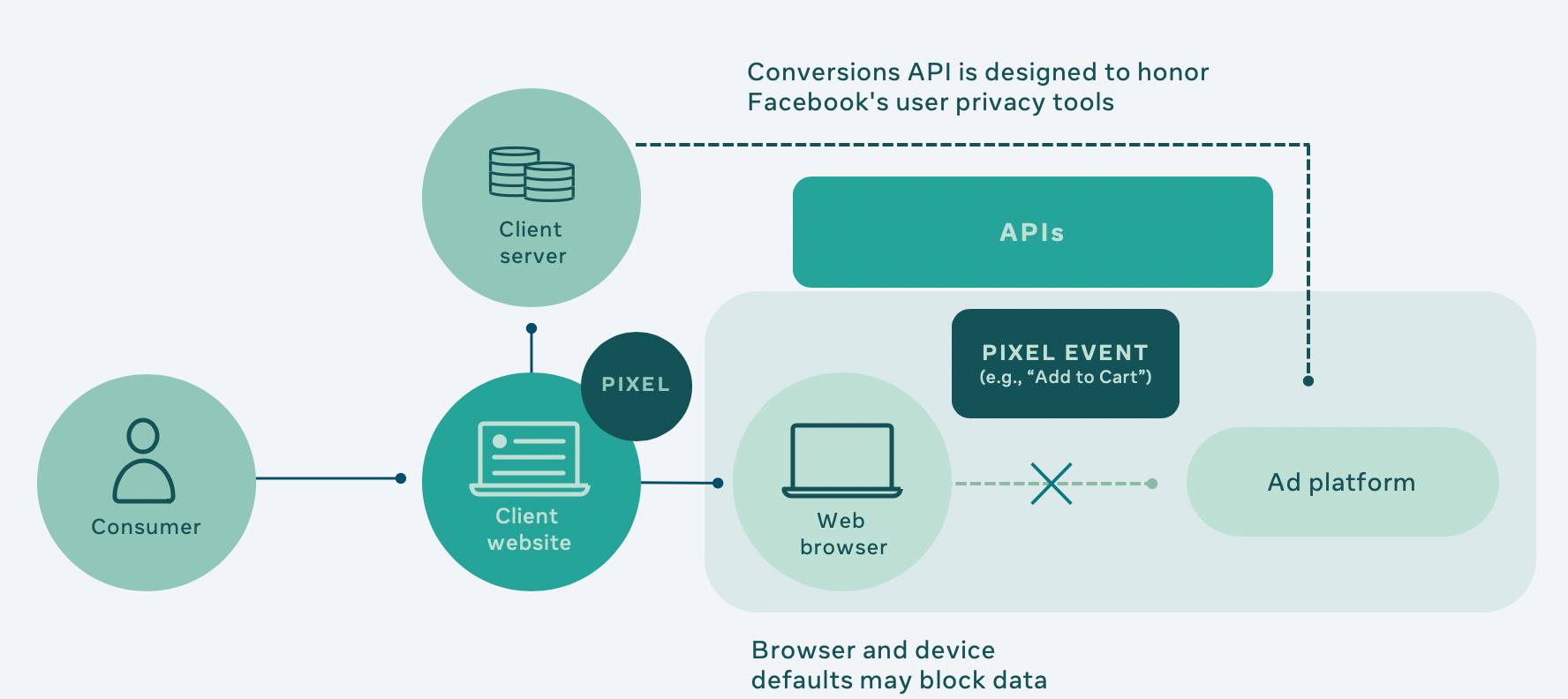Currently, most companies use Facebook Pixel for tracking users visiting their websites. It is installed directly on the website or indirectly via the Google Tag Manager. Whenever a user visits the website, the pixel fires at the browser level. As the user spends time on the website, his/her actions are tracked by the pixel and sent by the browser to Facebook. The user’s actions are then displayed by Facebook on Ads Manager.
However, using Facebook Pixel at the browser level has its flaws wherein it could get blocked by privacy control tools such as ad blockers which results in data loss. Facebook Conversions API solves this issue as it moves user conversion tracking to the server-side from the browser or client-side.
What is Facebook Conversions API?
Facebook Conversions API is a tool that can be used by advertisers to maintain data privacy when they deliver a personalized ad experience to their users. It was previously known as the Facebook Server-Side API.
It works in the following manner:
Facebook assigns and sends a unique ID to the server when a user lands on a company’s website by clicking on a Facebook Ad. Through the unique user ID, the server tracks the user’s behavior and conversions on the website such as the page views, purchases, lead submissions, etc. The server then sends messages back to Facebook regarding the actions performed by the user ID.

Source: markeko.com
Benefits of Facebook Conversions API
Data Accuracy – As the data sharing is done via the server instead of the browser, it’s more accurate. When data is shared by the browser as in the case of Facebook Pixel, there are chances of it getting lost due to an ad blocker or a browser crash.
Data Control – The Conversions API gives advertisers the ability to control what data they can share and when they can share it. It is quite superior to Pixel as the latter gives limited data control and shares events in real-time.
Better Insights – The API tracks more user conversions and data than Facebook Pixel which gives better insights into the performance of Facebook campaigns. This in turn will enable advertisers to effectively optimize their budgeting and bidding for their audiences.
Faster Page Loads – As the Facebook Conversions API uses server-side tracking, the server handles all the tracking tasks leaving the browser free. The browser is not required to load tracking scripts and this helps in faster website page loads and prevents tracking errors that are usually seen via browser-side tracking.
Lemnisk and Facebook Conversions API
Lemnisk Customer Data Platform offers marketers a single platform to:
- collect and manage all your marketing data across- web, app, data warehouse, CRM, call center, transactions systems, etc.
- offer real-time and personalized experiences across marketing channels to users.
Lemnisk is pre-integrated with Facebook Conversions API, so you can directly send events (Branch visits, policies issued, claims made, store transactions, product back in stock, card transactions done, etc.) from the CDP to Facebook via the Conversions API. If you’d like to understand how Lemnisk CDP + Facebook Conversions API can create value for your business, talk to your account manager today. Or write to us at marketing@lemnisk.co.
By Bijoy K.B | Marketing Manager at Lemnisk

With the ROI snapshot and lead progress reports, you’re viewing the campaign level to see how your campaigns perform overall. With the post-engagement report, it’s time to get into the nitty-gritty of how your individual Facebook ads are performing.